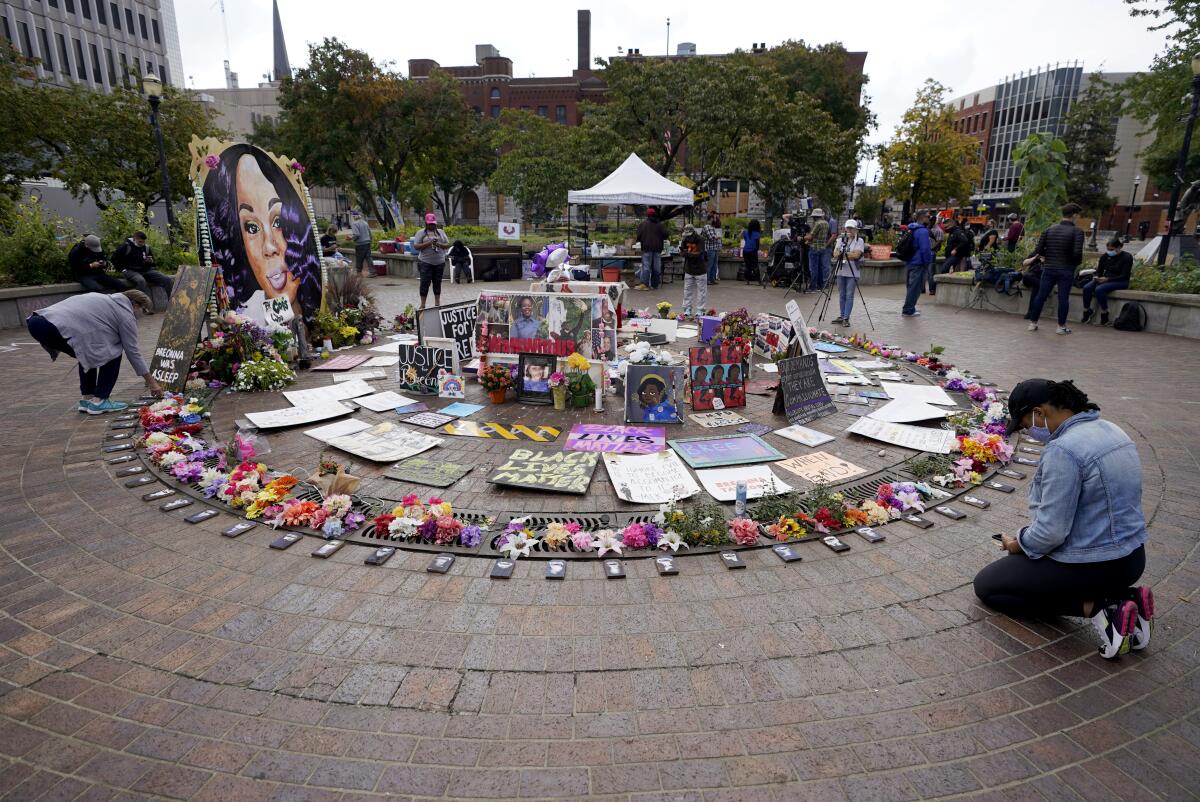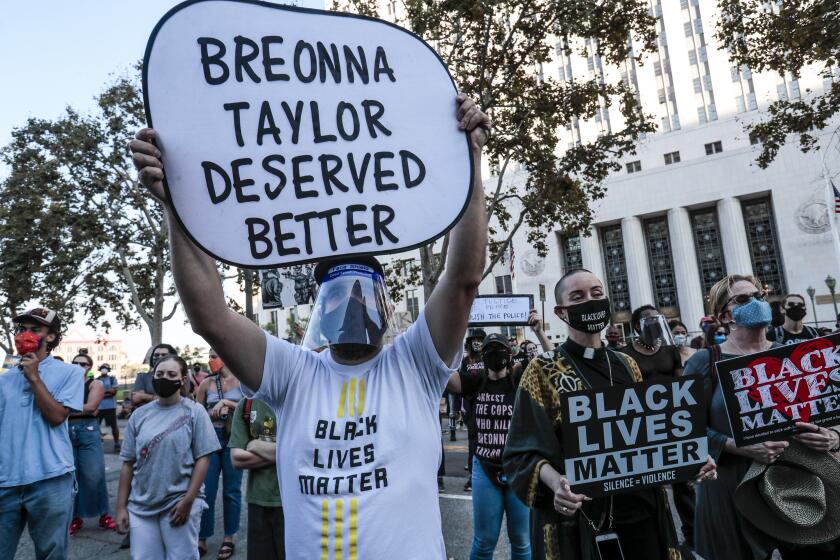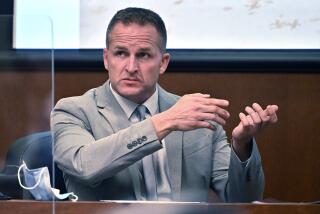‘A lot of hurt.’ With no police charges in Breonna Taylor case, mourning blankets Louisville and nation

- Share via
LOUISVILLE, Ky. — A day after grand jurors declined to charge officers for killing Breonna Taylor — a Black woman who was shot dead at night inside her own apartment six months ago — a quiet sense of mourning has engulfed this city tucked along the banks of the Ohio River, now the epicenter of national outrage over police killings of unarmed Black people.
Concrete barriers and dump trucks blocked off several streets in downtown Louisville on Thursday as National Guard troops stood watch at intersections. In an image that harkened back to the weeks after Taylor’s death, plywood covered the windows of most mom-and-pop shops, banks, hotels and restaurants.
“Hurt,” said Robyn Williamson, an executive assistant, while running into a downtown office building to grab supplies. “That’s all I can manage to say. Hurt. A lot of hurt.”
Mayor Greg Fischer, speaking at a news conference on Thursday, called for peace in the city, while acknowledging the pain felt by many here.
“The question obviously is: What do we do with this pain?” said Fischer. “There is no one answer, no easy answer to that question.”
As an evening curfew drew close on Thursday night, several dozen protesters arrived downtown. They marched through streets blocked off from traffic and went to a park along the Ohio River chanting “Say her name!” and “No justice, no peace.”
Some carried gas masks and appeared ready for confrontation. Cellphones blared in unison as the city sent out emergency alerts reminding people of the curfew.
On Wednesday, hours after Kentucky Atty. Gen. Daniel Cameron announced the grand jury’s findings, protesters marched peacefully through the city for several hours. Shortly before the city’s 9 p.m. curfew, gunshots rang out and Louisville’s interim police chief, Robert Schroeder, announced that two police officers had been shot.
Here’s a timeline of events in the shooting of Breonna Taylor, whose killing by police inside her Kentucky home has encouraged a national reckoning on race.
Officer Aubrey Gregory was struck in the hip and was treated and later released from a hospital. Officer Robinson Desroches, who joined the force 18 months ago, was shot in the abdomen and underwent surgery.
A 26-year-old man, Larynzo Johnson, has been charged with two counts of assault on a police officer and 14 counts of wanton endangerment of a police officer.
Law enforcement officials said that 127 people were arrested during Wednesday’s protests.
Gov. Andy Beshear on Thursday called on Cameron to make public all documents from the grand jury proceedings in the interest of transparency and helping the public heal.
“One of the problems we’ve had over the last six months is a total lack of explanation and information,” Beshear said in a television interview. “And the vacuum that’s created there — our emotions, frustrations — can truly fill that. It’s time for people ... to be able to come to their own conclusions about justice.”
Cameron, for his part, has said releasing the information could complicate any future investigation.
Taylor was killed in March by white officers who used a “no-knock” warrant filed under a narcotics investigation to barge into her apartment. Her boyfriend, Kenneth Walker, says he yelled multiple times, then reached for his licensed handgun and fired, wounding an officer, when he didn’t hear any response. The officers returned fire, hitting Taylor, an emergency medical worker, with multiple rounds.
No officers were charged in Taylor’s death, but one since-fired officer, Brett Hankison, was charged with three counts of wanton endangerment for allegedly firing into Taylor’s neighbors’ home during the incident.
Nationwide, police officers who kill unarmed Black people often are not charged, but Dallas County appears to be an outlier.
The charges Hankison faces carries a sentence of up to five years. When Hankison was fired in June, his attorney wrote an appeal to the Louisville Police Merit Board calling the officer’s firing a “cowardly political act.”
The grand jury announcement this week set off a wave of protests in cities from Los Angeles to New Orleans, New York to Atlanta.
Benjamin Crump, an attorney for Taylor’s family, used social media to voice his anger at the decision.
“The rallying cries that have echoed throughout America were once again ignored by its justice system. When a justice system only acts in the best interest of the most privileged and whitest among us, it has failed!” he tweeted. Earlier this month, Taylor’s family received $12 million in a settlement with the city.
A 9 p.m. curfew in Louisville was due to end on Saturday, but Fischer announced earlier in the day that it would be extended through the weekend.
The curfew, he said, “helps us balance our responsibility to keep everyone — protesters, first responders and bystanders — safe, while still allowing people the time and space to voice their calls for racial justice and equity during the day.”
In downtown Louisville earlier on Thursday, near Jefferson Square Park, a hub for what have been months of protests, cardboard signs were strewn on the ground.
“Breonna’s Life Mattered.”
“We love you Breonna.”
“Stand with Black women.”
Several dozen people milled around, talking to television journalists as a siren blared off in the distance.
A man who would only give his first name, Josh, said he had been protesting in the park for 100 days.
“We’re not going anywhere,” he said, sipping an orange Gatorade. “We might have to burn this city. This is my city, but sometimes you got to burn it all down to make it work better.”
Williamson, the executive assistant, works a short walk from the park. While she said she’s hurting, she said she does not want the city to experience the violence seen in Minneapolis in the wake of George Floyd’s killing at the hands of police in May.
“This isn’t all just going to go away,” she said. “It can’t. We need justice, or something that at least feels like it.”
More to Read
Sign up for Essential California
The most important California stories and recommendations in your inbox every morning.
You may occasionally receive promotional content from the Los Angeles Times.















